29 Jul General Conference 2017; Removal of the Philippines
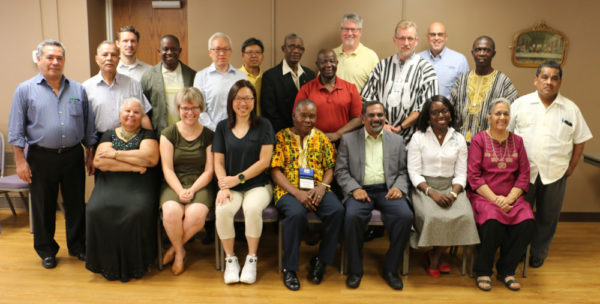
Seated (l-r): Benulda Saenz (Honduras), Jana (undisclosed), Karis Vong (Macau), Moses Somah (Liberia), Winston Smith (Jamaica), Adama Thorlie (Germany), Miriam (undisclosed). Standing (l-r): Gonzola Alas (Honduras), Moises Saenz (Honduras), Matthew Robertshaw (Canada), Justin Marva (Sierra Leone), Kin Keung Yiu (Hong Kong), Carol Chan (Hong Kong), Isaac Nugent (Jamaica), Alimamy Sesay (Germany), Brian Magnus (Canada), Jeff Bleijerveld (US), Todd Fetters (US), John Pessima (Sierra Leone), Juan Pavon (Nicaragua).
The 52nd General Conference, our international governing body, met July 16-17 at King Street Church in Chambersburg, Pa. Their last meeting was in May 2013 in Kitchener, Ontario, Canada. The 1925 General Conference was also held in Kitchener.
Each of the ten national conferences could send two delegates. There were also representatives from several mission districts. Families from United Brethren churches in the Chambersburg/Greencastle area hosted the international delegates overnight. These persons attended:
National Conference Delegates
- Sierra Leone: John Pessima (bishop) and Justin Marva.
- Canada: Brian Magnus (bishop) and Matthew Robertshaw, the missions commission chair.
- Nicaragua: Juan Pavon, general superintendent.
- Honduras: Gonzalo Alas (bishop), and Moises Saenz (his wife, Benulda Saenz, who is also a minister in Honduras Conference, came as interpreter).
- Hong Kong: Kin Keung Yiu (superintendent) and Carol Chan, missions director.
- Jamaica: Isaac Nugent (bishop) and former bishop Winston Smith.
- United States: Todd Fetters (bishop) and Jeff Bleijerveld, director of UB Global.
Three national conferences were not represented: Mexico, the Philippines, and Guatemala.
Mission Districts
- Germany: Alimamy Sesay (pastor) and Adama Thorlie.
- Liberia: Moses Somah (resident bishop).
- Macau: Karis Vong, pastor of Living Water church in Macau.
- Representatives from two undisclosed countries.
These mission districts were not represented: Haiti, El Salvador, Costa Rica, and Thailand.
General Conference is scheduled to meet every three years. The last meeting was in 2013. A meeting was planned for 2016 in Jamaica, but it had to be postponed. They decided to wait until 2017, and tack General Conference onto the end of the US National Conference. That way, the General Conference delegates could participate in the 250th anniversary of the denomination.
The 2001 General Conference adopted a truly international structure. Before that, with no separate meeting of the US National Conference, the US business and international business were mixed together. Starting in 2005, the General Conference has been a mostly relational meeting, during which United Brethren international leaders share the victories and challenges they face and their outreach and missionary endeavors. Each of the national leaders are prayed over by all of the other UB leaders.
The General Conference also serves as the international “membership committee” to oversee all of the national conferences and mission districts. National conferences report any changes to their national documents, structure, and stands on social and moral issues. This important role helps keep all of our conferences on track. Mission districts are also shepherded through the process of becoming national conferences.
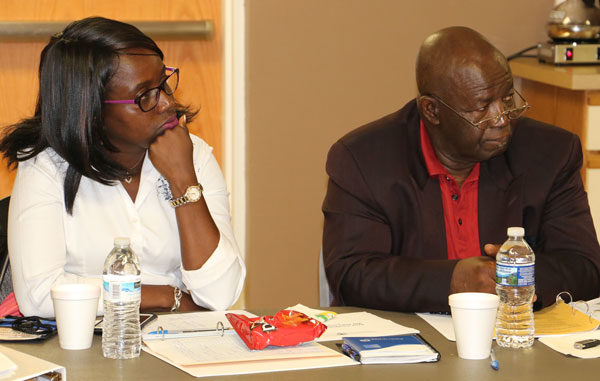
Adama Thorlie (left) and Alimamy Sesay of the German mission district. This is the first General Conference at which Germany has been represented.
Germany and Liberia
For the first time, General Conference had representatives from Germany and Liberia. Both are mission districts of Sierra Leone Conference.
In 1997, an independent church started in Berlin, Germany. The church targeted the many African immigrants in Berlin, especially persons who had fled the fighting in Liberia and Sierra Leone. Peter Sorie Mansaray, a Sierra Leonean, became the first pastor in 2003. In 2006, the congregation felt led to affiliate with Sierra Leone Conference. The church’s website now says the church is “directly answerable to the Bishop of the Sierra Leone Conference.”
The delegates to General Conference were the current pastor, Alimamy Sesay, and Adama Thorlie, a lay woman who has been part of the church since it started; she is a social worker in Berlin, and has lived half of her life in Sierra Leone and half in Germany.
Around 2011, Sierra Leone Conference began a relationship with a group of nine churches in Liberia. These churches trace back to 1981, when they split from another group and adopted the name “Church of the United Brethren in Christ International.”
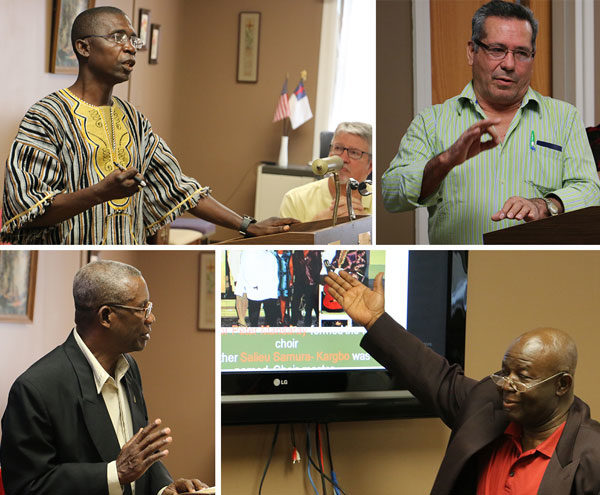
Conference and mission district leaders reported on their work. Clockwise from upper left: John Pessima, bishop of Sierra Leone Conference; Gonzalo Alas, bishop of Honduras Conference; Alimamy Sesay, pastor of the UB church in Berlin, Germany; and Isaac Nugent, bishop of Jamaica Conference.
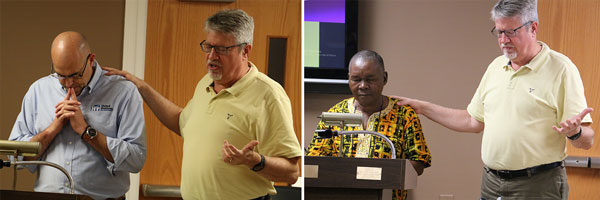
After each report, Brian Magnus stood with the delegate as prayer was offered for that country. Left: with Bishop Todd Fetters of the United States. Right: with Moses Somah of Liberia.
The Meeting Itself
The General Conference meeting began at 2 pm on Sunday, July 16, and concluded around 6 pm on Monday. Brian Magnus, Bishop of the United Brethren Church in Canada, led the meeting. Most of the time consisted of reports from the various national groups.
They went alphabetically through the national conferences, starting with Canada. Each conference took about 20 minutes to discuss their ministries, challenges, prayer needs, and other matters. After Bishop John Pessima gave his report for Sierra Leone Conference, they started hearing reports from the mission districts and advisory guests–nine reports, from China to Thailand.
After each report, the delegates stood while somebody led in prayer for that country.
On Monday afternoon, Mike Dittman, director of National Ministries for the US National Conference, led a session during which the representatives broke into groups of three or four persons to pray for each other. In several of the groups, United Brethren from three different continents joined hands as they prayed for each other.
Removal of the Philippines National Conference
In 2005, we accepted two new national conferences: Mexico, and the Philippines. Both consisted of a group of churches which wanted to affiliate with us. They became the eighth and ninth national conferences. In 2010, Guatemala was added as the tenth.
Very quickly, concerns arose about the Philippines. They were not following through on commitments made regarding governing documents and elections. They have not sent representatives to any General Conference since 2005, and for many years now, have not responded to any communications.
Brian Magnus and Jeff Bleijerveld went to the Philippines in late 2011 for about a week. They did pastoral training, taught about UB history and doctrine, and talked to leadership about developing proper documents and a constitution. In 2012, we engaged the services of Steve Read of Action Ministries International; he grew up in the Philippines and has served all of his ministry years there. He met with Philippine leaders once or twice, but they did not follow through.
Letters were sent prior to the 2013 General Conference, but without response. The 2013 General Conference voted to suspend the membership of the Philippines. Letters and emails were subsequently sent, with warnings that if we didn’t hear from them, they would be removed as a national conference. Again, no response.
“We’ve heard nothing from them, at all, for many years,” said Brian Magnus, chairman of the International Executive Committee.
The only item of business before the 2017 General Conference involved a recommendation to remove the Philippines from membership in the Church of the United Brethren in Christ International. Brian Magnus explained the situation: “They have not had any elections, ever, as far as we know. They don’t have proper documents in place. They are legally registered with their country, but as far as a proper constitution and structural documents, we’ve never seen them.”
The churches of the Philippines have a website and a Facebook page. But in 2015, they removed all reference to the United Brethren church. Said Bishop Isaac Nugent of Jamaica, “It seems that they have already taken action to disassociate themselves from us.”
Magnus agreed. “We would be formalizing what they’ve already decided to do.”
Bishop John Pessima of Sierra Leone made the motion to remove the Philippines from membership in the Church of the United Brethren in Christ International. It passed unanimously.
So now we have nine national conferences. However, several mission districts–El Salvador (5 churches), Liberia (9 churches) and Haiti (19 churches)–are looking at organizing as national conferences in the near future.
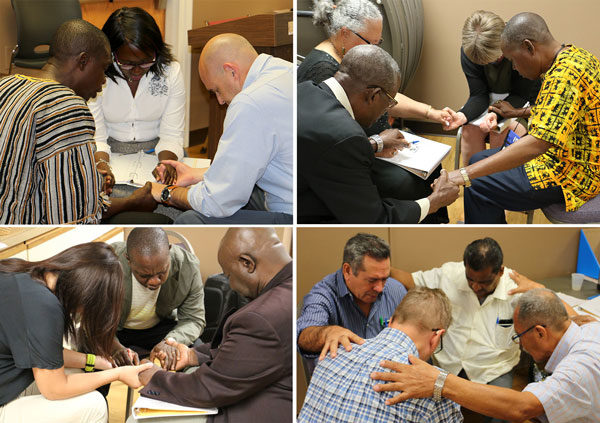
The delegates split into groups for a time of prayer on Monday afternoon. In most of the groups, three different continents were represented.
International Executive Committee Meeting
The General Conference has an executive committee, which is made up of the highest leader (usually bishop or general superintendent) of each national conference. They elect a chairperson and secretary, and decide on General Conference dates and locations. They also conduct any business between General Conferences.
The chairman of the International Executive Committee chairs the next General Conference. Bishop Brian Magnus of Canada was elected as the chairperson of the IEC at it’s very first meeting in 2002, and was re-elected to a fifth term on July 17 when the IEC met after the close of the 52nd General Conference.
Bishop Isaac Nugent of Jamaica offered to host the next General Conference in the winter/spring of 2020.

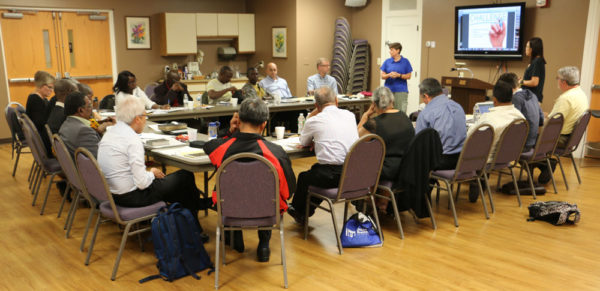
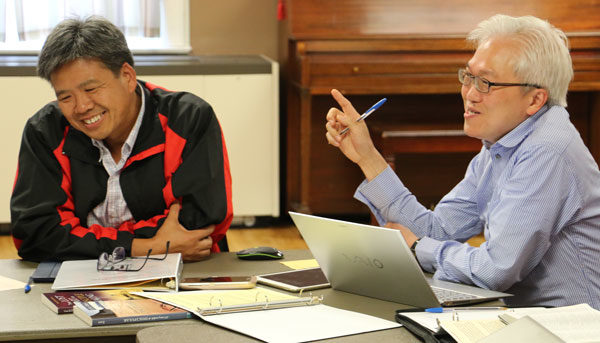
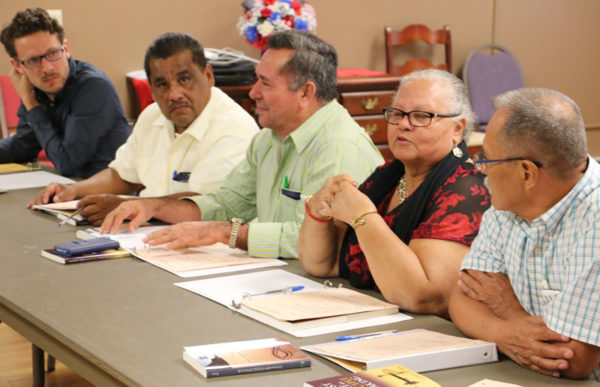
No Comments